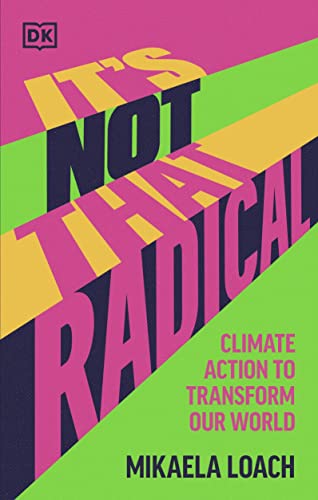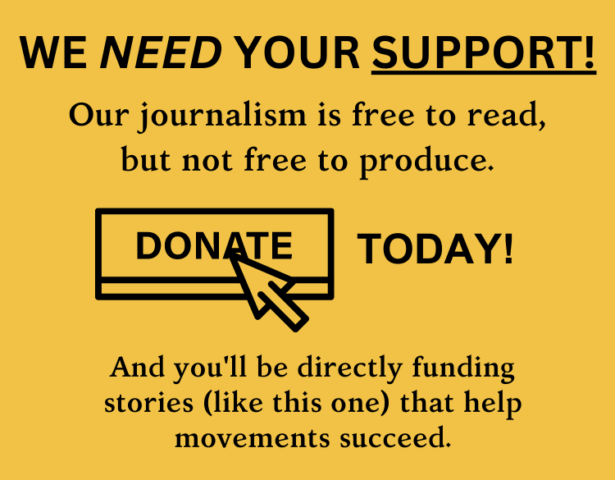It’s not an easy time to be a climate activist. Global carbon emissions continue to rise. The climate emergency is already hitting communities across the world with record-breaking heat, floods and wildfires. And the climate movement, despite raising awareness of the crisis, has not yet succeeded in triggering the change we need.
Translating growing public concern into action has proved a challenge. In the U.K., where I live, Extinction Rebellion’s “The Big One” was heralded as a new phase in mass mobilization by the climate movement. Its goal: generate sufficient numbers to force the government into action and provide, for some, a welcome break from disruptive tactics. By building coalitions between unions, NGOs and activist groups, Extinction Rebellion achieved hefty attendance figures (100,000 people across four days).
But without the civil disobedience of previous actions, government and media attention was nowhere to be seen. Meanwhile, more radical tactics like those of Just Stop Oil have left nonviolent protesters facing hefty prison sentences. And last month, the government rushed through new anti-protest legislation in an attempt to prevent others getting involved — just when the climate movement needs new energy, new ideas and new blood.
These same conditions are having a knock-on effect on broader public sentiment. Across Europe, research shows that young adults know the status quo isn’t working, but feel powerless to change it. They don’t believe individual lifestyle tweaks are enough to combat the climate crisis, but when asked to suggest alternative courses of action, they struggle. Cynicism is widespread, and young people lack specific examples of what large-scale change could look like. And while many are concerned about both climate change and social justice issues, fewer understand the link between them.

Against this backdrop, when I picked up Mikaela Loach’s new book, “It’s Not That Radical: Climate Action to Transform our World,” I was skeptical. Loach, a 25-year-old Jamaican-British medical student, has attracted a large social media following for her work as a climate justice activist. Despite her youth, Loach is something of a stalwart in the climate movement, having organized her first fundraising bake sale for tsunami victims at the age of five. In 2019, she locked on to a site in Westminster as part of Extinction Rebellion’s October Rebellion, and in 2021 she took the U.K. government to court for giving tax breaks and subsidies to oil and gas companies.
As an influencer deeply immersed in climate work — and one who has spoken publicly of the resulting burnout — I feared Loach’s book would be stuck in the weeds of climate doomism, movement jargon and generalized calls to “get involved” with little detail of what that meant.
Instead, I found a hopeful, compassionate and inclusive invitation to join the fight for climate justice, firmly grounded in the specifics of what injustice looks like, and how we can challenge it.
For newcomers to the climate movement, this book covers useful ground. It begins by laying out the problem: the links between climate change, capitalism and racial injustice and the so-called “solutions” that promise only to preserve the status quo. These topics are movingly introduced with a conversation between Loach and her Jamaican grandmother. Loach learns that Hellshire Beach in Jamaica, where she spent evenings playing as a child, has now almost disappeared due to the climate crisis.
This is typical of the book’s style, where aptly chosen quotations from Audre Lorde and Naomi Klein interweave with stories of Loach’s own climate journey — from teenage lifestyle shifts into growing awareness of activism, and the struggles she has faced as a person of color within white environmentalist spaces.
Facts and figures are used sparingly but effectively, particularly when taking on the false equivalence between population growth and emissions in the Global South. “In less than one day,” Loach summarizes, “the average person in the U.K. has already created the equivalent emissions of the average person in Niger in a whole year.” And from the Indigenous communities in the Amazon, whose water is poisoned by mercury and oil, to the people of color in the U.K. forced to live alongside polluting incinerators, Loach never loses sight of the real victims of climate injustice. Their stories are recounted with deep empathy and respect.
This compassion shares the stage with anger. Rightly so. The climate emergency, in Loach’s telling, is not a tragedy but a scandal. So-called “inaction” by governments, she writes, “isn’t passive — it is violence.” She provides a withering take down of how the fossil industry systematically denied, delayed and greenwashed the world into our current crisis (and offers the almost unbelievable revelation that BP originally named itself “The First Exploitation Company”).
Her insistence that climate change is the deliberate choice of a small number of powerful organizations and individuals opens a critical space for action. As these actors imagined the world we currently live in — its slavery, genocides and exploitation — so we too can imagine a better one. In doing so, we must be wary of false “fixes” that reinforce existing oppression. Electric car production, for example, relies on lithium extraction in Bolivia, Chile and other Andean nations, polluting the waters with toxic chemicals and harming communities and ecosystems. Why not instead create better and cheaper public transport, reduce cars on the streets and boost infrastructure to encourage cycling and walking? “We can do so much better,” Loach insists.
This is the book’s clarion call. In its second half, Loach turns her attention to solutions — not those enacted by governments and CEOs, but by ordinary people. Again, these are illustrated with examples from her own life. In one, she recounts how activists publicly embarrassed Shell’s CEO on a conference panel, leading to the indefinite delay of a new oil field in the North Sea.
Loach acknowledges the role of “softer tactics” such as fundraising, awareness-raising and charitable volunteering to further climate action. Yet she also invites those who can to go a step further, into collective direct action and community organizing. Readers are urged to join a climate group or a union, support strike funds and participate in protests (although backstage support is, she stresses, as valuable as gluing yourself to a road). Such actions are not “too radical,” Loach argues, citing Angela Davis’ belief that “radical simply means grasping things at the root.” Instead, we must dare to reimagine what is possible when we challenge the exploitative systems on which our society is built.
In these sections, Loach also explores what kind of movements are needed to achieve a just transition. Ironically, much coverage of Loach’s book — and her work in general — portrays her as the golden child of a new generation of climate activists, ready to right the wrongs that their forebearers have inflicted.
Yet for Loach, this kind of “hero worship” within activist spaces is counterproductive. Idolizing individuals such as Martin Luther King, Loach argues, diminishes the efforts of the thousands of others behind the scenes, and disempowers potential activists who believe they must be exceptional to participate. Relying on charismatic leaders, she suggests, weakens movements and leaves us waiting for heroes rather than taking matters into our own hands. “Seriously, stop fucking waiting,” she insists. “You’ll be disappointed.”
Reading “It’s Not That Radical” feels like having a conversation with a well-informed but compassionate friend. Loach explicitly acknowledges the weight of her subject (“Whew. That’s a lot. I know it is.”) She calls us to feel the grief and panic, and then to transform those feelings into action. A critical part of this work, she emphasizes, is freeing our minds to consider the options we’ve previously been told are “too radical,” or just impossible dreams.
In the book’s final chapter, Loach offers her readers the space to imagine “the best, most liberated and joyful world you can imagine.” For me, this exercise was moving and powerful. It showed me how much I had limited my expectations: hoping only to avoid catastrophe, rather than build something infinitely greater in its place. As Loach would say, we can do better than that.

If you are a seasoned climate activist, this book may indeed seem not that radical. It might say little that you don’t already know about climate justice or building healthy movements (although we can never be reminded of these things too often). But Loach is not trying to preach to the converted. “If you’ve ever felt that the current situation is too big or too complicated for you to understand or even begin to tackle,” she writes in her introduction, “this book is for you.” For these people — those who see the crisis we are in, recognize the entrenched problems of climate and racial injustice but don’t yet understand how they are connected or how we can begin to uproot them — this book is the perfect primer.
Tangible, inclusive and insistently hopeful, “It’s Not That Radical” will spur newcomers into activism and re-energize those of us whose hopes are dwindling. Give this book to your well-intentioned friends, skeptical parents and despairing children. And, when you feel your imagination being diminished, pluck it off your own bookshelf too.
“This is the book that I’ve wished existed for so long,” writes Loach in her introduction. We should be grateful that it does.
